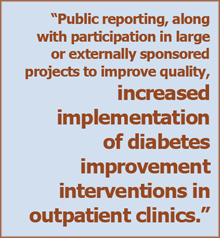Synopsis
A survey of more than 400 primary care clinics that have been publicly reporting data on how well they deliver diabetes care found that such public reporting helped drive early adoption of diabetes care improvement activities, including patient registries and care reminders. Public reporting also seems to have promoted the adoption of multiple improvement interventions over time.

The Issue
Although quality-of-care data for physician groups have been publicly reported for some time, little is known about how physicians respond to this feedback. With Commonwealth Fund support, researchers sought to assess the link between public reporting on diabetes care and physicians’ activities to improve the quality of care they provide to patients. The study team focused on doctors participating in the Wisconsin Collaborative for Healthcare Quality, an organization of physician groups that has been publicly reporting performance data for diabetes care since 2004. Physicians in this group represent about half of the state’s primary care physicians, and have been shown to provide better care at lower costs than their peers.
Key Findings
- Implementation of diabetes care interventions among the collaborative’s physician groups increased notably from 2003 to 2008, by which time nearly half of the clinics had implemented 11 or more interventions.
- There was steady growth in use of the following “best practices”: telephone and mail reminders to patients about upcoming appointments or tests; prompts to providers about recommended care; diabetes care guidelines and/or protocols; patient registries; and inclusion of specialists, such as endocrinologists, in care teams.
- Clinics that had no prior experience in diabetes improvement were more likely to adopt single, rather than multiple, interventions in response to public reporting.
- Clinics that focused on diabetes metrics, but did not see themselves as doing so in response to public reporting, were more likely to implement multiple interventions in a given year. Often, such clinics were participating in external quality improvement projects promoted by their health systems, such as the National Committee for Quality Assurance’s recognition program for diabetes care.
Addressing the Problem
To engage physician groups most effectively, “accountability metrics should be structured to capture incremental improvements in quality,” the researchers say, “thereby rewarding both early and ongoing improvement activities.” Public reporting seems to have encouraged clinics with no prior quality improvement experience to “get off the sidelines” and engage in an initial improvement activity.
About the Study
The study authors surveyed 409 primary care clinics within 17 large, multispecialty physician groups participating in the Wisconsin Collaborative for Healthcare Quality. Clinics were asked about their diabetes care improvement interventions, as well as their organization and infrastructure. The primary outcome measure was the number of interventions implemented from 2003 to 2008, out of 22 possible interventions drawn from the chronic care model.
The Bottom Line
Public reporting seems to have driven early adoption of diabetes care improvement interventions and the adoption of multiple, simultaneous interventions over time.


